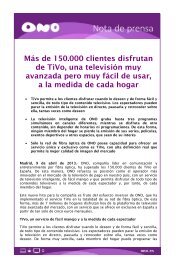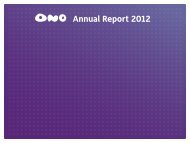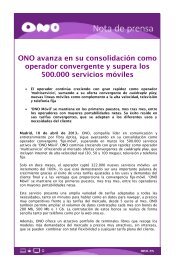Annual report (20-F) - Ono
Annual report (20-F) - Ono
Annual report (20-F) - Ono
You also want an ePaper? Increase the reach of your titles
YUMPU automatically turns print PDFs into web optimized ePapers that Google loves.
interconnection and/or access to their networks or associated facilities. The Access Directive sets out<br />
objectives for national regulatory authorities with regard to access and interconnection.<br />
Interconnection agreements are subject to the supervision of the CMT and to Spanish<br />
regulations. Royal Decree 2296/<strong>20</strong>04 applies to Interconnection, Access to Public Networks and<br />
Numbering. The Interconnection Decree requires Telefónica to submit a “reference interconnection offer”<br />
(RIO) to the CMT containing, amongst others, its proposed price terms, which shall be cost-oriented. The<br />
last interconnection reference offer is the RIO <strong>20</strong>03.<br />
The Interconnection Decree requires that unless the parties agree otherwise, interconnection<br />
agreements must be reached within four months from the date of any request to start negotiations. In the<br />
event the parties cannot agree on such terms, the CMT will decide the terms applicable to the related<br />
interconnection agreement.<br />
Access to the Local Loop<br />
Until a new regulation implementing the new General Law on Telecommunications is enacted,<br />
access to the local loop is governed by the Access to the Local Loop Royal Decree of December 22, <strong>20</strong>00.<br />
The Royal Decree provides for conditions in which operators of fixed telephony service available to the<br />
public and fixed public telephony networks with significant market power, currently Telefónica, will<br />
provide access to the local loop and related resources to the corresponding authorized operators. These<br />
operators must publish a local loop offer, including, amongst others, the relevant technical and economic<br />
conditions. According to this Royal Decree, tariffs for the provision by Telefónica of access to the local<br />
loop must be cost-oriented.<br />
The last local loop offer published by Telefónica was approved by the CMT on March 31, <strong>20</strong>04.<br />
Numbering and Operator Selection<br />
In order to provide telecommunications services, operators need to be furnished with public<br />
numbering resources, i.e. the ability to allocate phone numbers among subscribers or users of telephony<br />
services in accordance with the applicable, government approved, National Numbering Plan. The CMT<br />
has the authority to allocate numbers and must act within a maximum period, currently three weeks, from<br />
the date of the relevant application.<br />
The General Law on Telecommunications and the Royal Decree 2296/<strong>20</strong>04 address operator<br />
selection, which refers to the ability of the subscriber or user to select a given operator for all or certain<br />
calls. The operator to be used can be chosen ahead of time or on a call-by-call basis. The operator selected<br />
must transport the calls effectively and efficiently. Operators with significant market power in the<br />
provision of connection to and use of the public telephony network at fixed locations—currently<br />
Telefónica—are obliged to provide operator selection. The Government is allowed to impose operator<br />
selection obligations on other type of networks.<br />
On August <strong>20</strong>01, Circular 1/<strong>20</strong>01 issued by the CMT entered into force to establish the<br />
instructions to implement preselection mechanisms for subscriber lines connected to digital telephony<br />
switches for metropolitan calls, long distance and fixed-to-mobile calls. Additionally, as of March 1,<br />
<strong>20</strong>03, and pursuant to Circular 2/<strong>20</strong>02 of the CMT, fixed-line public telephony network operators that are<br />
obliged to implement operator selection mechanisms are required to offer preselection and selection on a<br />
call-by-call basis for metropolitan, long distance and fixed-to-mobile calls to intelligent network<br />
numbering (including personal numbering, but excluding collect call numbering) and to paging services.<br />
Finally, pursuant to Circular 1/<strong>20</strong>02, issued by the CMT, Telefónica was obliged to implement<br />
preselection mechanisms for subscriber lines connected to analog telephony switches prior to January 31,<br />
<strong>20</strong>03, the date as of which this form of preselection was required to be available for long distance,<br />
metropolitan and fixed-to-mobile calls under the same conditions as preselection offered to subscriber<br />
lines connected to digital telephony switches.<br />
Number Portability<br />
Under the General Law on Telecommunications, users or subscribers shall have the right to keep<br />
their existing telephone numbers when contracting for the same telecommunications services from a new<br />
provider, in the cases to be established by the relevant implementing regulation. The General Law on<br />
40
















